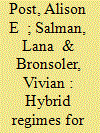| Srl | Item |
| 1 |
ID:
107527


|
|
|
|
|
| Publication |
2011.
|
| Summary/Abstract |
Addressing issues of renewable energy in North Africa must incorporate concerns regarding the compatibility of energy mixes with the nature of political regimes, their geopolitical relevance, and their socio-economic effects, in addition to economic cost-benefit deliberations. One important and under-researched aspect of nuclear energy refers to the trade-off between socio-economic development and political power conservation. Competing interests in North Africa's energy market as well as aspects of regional cooperation capacity are important when assessing the choice between renewable and nuclear energy. Therefore, the future course of meeting North Africa's energy needs is subject to a complex political and economic interplay between domestic and geopolitical development interests. The objective of this paper is to explore this complexity in more detail. We argue that the identification of any energy alternative as superior is hardly convincing unless certain standards of inclusive governance are met. We also find that it is important to highlight political-economic differences between energy importers like Morocco and Tunisia and energy exporters like Algeria, Libya, and Egypt.
|
|
|
|
|
|
|
|
|
|
|
|
|
|
|
|
| 2 |
ID:
156834


|
|
|
|
|
| Summary/Abstract |
There is a growing recognition that the state is not the sole provider of “local public goods” such as water and education in the developing world. Mainstream approaches to the study of local public goods provision, however, have yet to incorporate these insights. We offer a descriptive typology of hybrid local public goods regimes, or systems in which both state and non-state actors contribute to provision. It emphasizes two dimensions: the type of state involvement (direct versus indirect provision), and the degree of formal state penetration. The politics of producing local public goods, we argue, takes on distinct forms in each cell. The framework allows scholars to develop more accurate and precise explanations of variation in service quality and access, and to choose more appropriate outcome measures. We illustrate the utility of this framework by analyzing distinct hybrid regimes for water and sanitation, and mass transit in Africa, Asia, and Latin America.
|
|
|
|
|
|
|
|
|
|
|
|
|
|
|
|